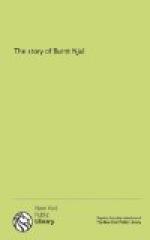A fourth great principle of his nature was the conviction of the worthlessness and fleeting nature of all worldly goods. One thing alone was firm and unshaken, the stability of well-earned fame. “Goods perish, friends perish, a man himself perishes, but fame never dies to him that hath won it worthily.” “One thing I know that never dies, the judgment passed on every mortal man.” Over all man’s life hung a blind, inexorable fate, a lower fold of the same gloomy cloud that brooded over Odin and the AEsir. Nothing could avert this doom. When his hour came, a man must meet his death, and until his hour came he was safe. It might strike in the midst of the highest happiness, and then nothing could avert the evil, but until it struck he would come safe through the direst peril. This fatalism showed itself among this vigorous pushing race in no idle resignation. On the contrary, the Northman went boldly to meet the doom which he felt sure no effort of his could turn aside, but which he knew, if he met it like a man, would secure him the only lasting thing on earth—a name famous in sons and story. Fate must be met then, but the way in which it was met, that rested with a man himself, that, at least, was in his own power; there he might show his free will; and thus this principle, which might seem at first to be calculated to blunt his energies and weaken his strength of mind, really sharpened and hardened them in a wonderful way, for it left it still worth everything to a man to fight this stern battle of life well and bravely, while its blind inexorable nature allowed no room for any careful weighing of chances or probabilities, or for any anxious prying into the nature of things doomed once for all to come to pass. To do things like a man, without looking to the right or left, as Kari acted when he smote off Gunnar’s head in Earl Sigurd’s hall, was the Northman’s pride. He must do them openly too, and show no shame for what he had done. To kill a man and say that you had killed him, was manslaughter; to kill him and not to take it on your hand was murder. To kill men at dead of night was also looked on as murder. To kill a foe and not bestow the rights of burial on his body by throwing sand or gravel over him, was also looked on as murder. Even the wicked Thiostolf throws gravel over Glum in our Saga, and Thord Freedmanson’s complaint against Brynjolf the unruly was that he had buried Atli’s body badly. Even in killing a foe there was an open gentlemanlike way of doing it, to fail in which was shocking to the free and outspoken spirit of the age. Thorgeir Craggeir and the gallant Kari wake their foes and give them time to arm themselves before they fall upon them; and Hrapp, too, the thorough Icelander of the common stamp, “the friend of his friends and the foe of his foes,” stalks before Gudbrand and tells him to his face the crimes which he has committed. Robbery and piracy in a good straightforward wholesale way were honoured




